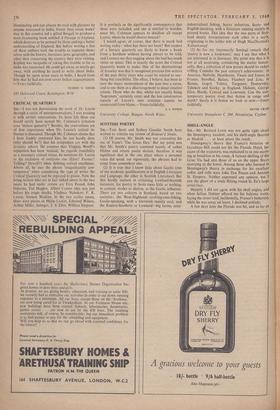Stn,-1 was not depreciating the work of Dr. Leavis through
a series of misrepresentations, I was praising it with certain reservations. To have left these out would surely have earned Mr. Coleman's irritation over 'defiant quixotry"? Besides, the reservations are of first importance when Dr. Leavis's critical in- fluence is discussed. Though Mr. Coleman claims that I have freshly contexted him, he can hardly deny (why should he?) that his sympathies are with the Scrutiny school. He assumes that Virginia Woolf's reputation has been 'mislaid,' he regards irascibility as a necessary critical virtue, he mentions Dr. Leavis to the exclusion of everyone else (Eliot? Forster? Trilling? Orwell?) when defining critical excellence. Above all, he uses the phrase 'insignificantly con- temporary' when considering the type of writer the Critical Quarterly can be expected to praise. Now the living writers who are in fact talked about in the two issues he had under review are Ezra Pound, -John Osborne, Ted Hughes, Albert Camus (this was just before his tragic death), Vladimir Nabokov, F. R. Leavis, Vernon Watkins. In the two earlier issues, there were pieces on Philip Larkin, Edmund Wilson, Arthur Miller, Salinger, T. S. Eliot, William Empson. It is precisely as the significantly contemporary that these were included, and one is entitled to wonder, since Mr. Coleman appears to disallow all except Leavis, whom he would choose instead?
I would .agree, of course, that there is much bad writing today : when has there not been? But readers of a literary quarterly are likely to know a hawk from a handsaw without having always to be told, and I cannot see that nagging about the bad has much claim on space. This is exactly the point the Critical Quarterly wants to make. One of the shortcomings of Scrutiny was that it recognised precious few writers of the past thirty years who could be treated to any- thing but irascibility. The effect, I believe, has been to turn the major masterpieces of the past into a norm, and to use them as a discouragement to lesser creative talents. Those who do this, whilst not exactly being `bogeymen,' certainly exist; and the less constructive aspects of Leavis's own criticism cannot be exonerated from blame.—Yours faithfully,
A. E. DYSON










































 Previous page
Previous page